We may earn a commission from links on our site, but this doesn’t affect our reviews. Learn more.
Hedge With Crypto is an independent publisher that provides objective and free content. Articles on our site may include links to our partners. If you click on these links, we may earn a commission. However, our editorial content remains unbiased, reflecting our own opinions or the general information available. For more information on our company policies, read the Affiliate Disclosure, Privacy Policy, and Terms & Conditions.
8 Best Ethereum Wallets
Hedge with Crypto aims to publish information that is factual and accurate as of the date of publication. For specific information about a cryptocurrency exchange or trading platform please visit that provider’s website. This information is general in nature and is for educational purposes only. Hedge with Crypto does not provide financial advice nor does it take into account your personal financial situation. We encourage you to seek financial advice from an independent financial advisor where appropriate and make your own enquiries.
TABLE OF CONTENTS
Digital assets such as Ethereum (ETH) are at inherent risk of being stolen if left unprotected. This is why it is crucial to research and invest in a good cryptocurrency wallet. However, with the expansion of the cryptocurrency ecosystem, there are now thousands of Ethereum wallets to choose from. In this guide, we will determine the best crypto wallets for storing Ethereum by assessing the most important features. Each wallet has been tested and rated based on its user-friendliness, cost, and security to help you make a decision.
Here's our short list of the best Ethereum wallets:
- ZenGo (best Ethereum wallet for features)
- Binance Chain Wallet (best ETH wallet for web users)
- Ledger X (best Ethereum hardware wallet)
- MetaMask (best wallet for dApps users)
- Ledger Nano S (best value for money wallet)
- Trezor Model T (best Ethereum wallet for security)
- Exodus (best wallet for beginners)
- Rainbow Wallet (best Ethereum wallet app)
Featured Partner
Kraken
Crypto platform for smarter investing.
4.8 out of 5.0
Kraken is a US-based crypto trading platform that is best suited for users who need crypto-to-fiat and crypto-to-crypto trading facilities. One of the most regulated and security-focused exchanges, Kraken is a great choice.
200+
USD, GBP, EUR, CAD, CHF, JPY & AUD
Bank transfer, SWIFT, SEPA, debit and credit card
0.16% (maker) and 0.26% (taker)
Reviews of the Top Ethereum Wallets
This section provides an overview of each wallet to store Ethereum. We have tested and carefully selected various options to provide the best ETH wallets for different categories. Our research has considered their features, benefits, limitations, and why someone should buy and use them.
1. ZenGo – Best Overall Ethereum Wallet For Features
ZenGo is a non-custodial wallet that launched in 2018 and is focused on offering a secure and convenient way to store digital currencies. However, thanks to the wallet’s success, alongside security, it now also offers a plethora of additional services.
Key Highlights:
- A mobile wallet that can be downloaded and used for free
- Swaps private keys for secret shares. One secret share is kept with ZenGo
- Backup recovery is complete using biometric face map data
- Employs 3FA for account access
- Purchase, swap, and earn interest on Ethereum directly within the app
Developed as a mobile application, ZenGo’s Ethereum wallet can be conveniently downloaded to both iPhone and Android devices. There are no one-off payments and no subscription fees, which makes it one of the cheapest Ethereum wallets on the market. Its multi-chain infrastructure means that, alongside ETH, it is compatible with over 100 different cryptocurrencies.

With regards to security, unlike competing Ethereum wallets, ZenGo swaps the use of traditional private keys for two independent mathematical secret shares. One secret share is stored locally on a mobile device, while the second is stored on ZenGo’s servers. This ensures that if one secret share is compromised, Ethereum holdings cannot be withdrawn. If a mobile phone is ever lost or stolen, access to a ZenGo wallet can still be recovered by using biometric face map data.
In addition to secret shares, the platform employs 3-factor authentication (3FA) for account access. ZenGo’s 3FA requires authentication from both email, a recovery file, and a biometric scan before access to an account can be granted. The extra authentication means ZenGo is one of the most secure software wallets for Ethereum investors. Although it ranks highly among software digital wallets, Ethereum stored on ZenGo will never be as secure as ETH stored in a hardware wallet such as Ledger Nano X or Trezor Model T.
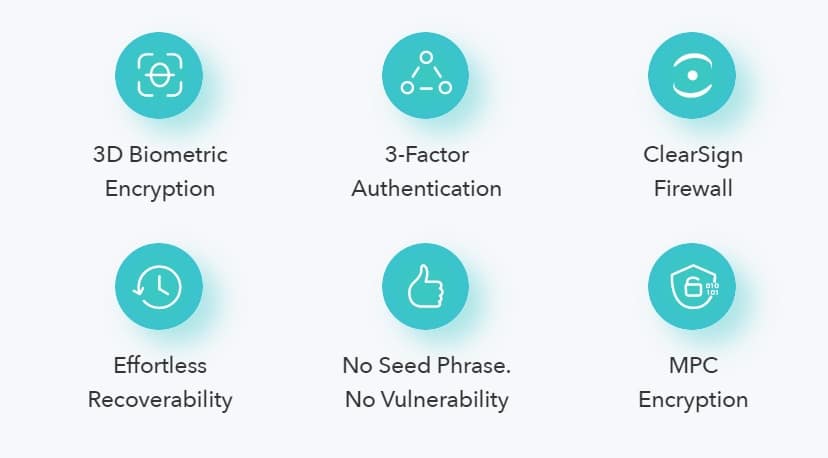
The risk of storing ETH in ZenGo may be offset by the range of extra features on offer. ZenGo wallet users can buy Ethereum directly from within the app using a credit/debit card or bank transfer. They can also securely swap Ethereum within ZenGo’s Swap and Trade module or place it in one of ZenGo’s Savings interest-bearing accounts, where interest APYs range from 1.5% to 8%.
With its novel security approach and abundance of integrated features, ZenGo provides a solid choice for new Ethereum investors. ETH can be stored securely, access to centralized and decentralized applications is quick and simple, and the range of extra features is far higher than other digital wallet competitors.
Zengo wallet Pros:
- Suitable for beginners that want an easy option to store Ethereum
- No technical knowledge required for handling private keys
- Fast to login and access ETH funds
- Free to download and use immediately
Zengo wallet Cons:
- Not as secure as a hardware wallet that are 100% offline
2. Binance Chain Wallet – Best Wallet For Ethereum Traders
Binance launched a non-custodial web browser wallet in 2020 called the Binance Chain Wallet. Although initially working with assets held on the Binance Smart Chain (now BNB Chain), the wallet soon expanded to accommodate the Ethereum blockchain and has become a popular choice for ETH investors.
Key Highlights:
- A browser extension wallet that can be downloaded and used for free
- Offers easy connection with Ethereum dApps
- Wallet Direct allows for Ethereum to be transferred to the Binance exchange without using an address
- Multi-authentication supported via tKey technology
The Binance Chain Wallet is a web-based Ethereum wallet that must be downloaded and installed as a browser extension. The wallet is currently compatible with Google Chrome, Firefox, and Brave and can be downloaded for free on all three web browsers. The benefit of being a web browser is the high convenience for those looking to utilize Ethereum funds within different DeFi applications and the best NFT marketplaces. All applications can be connected with just a couple of clicks. In addition to using Ethereum, the wallet also allows users to swap ETH coins and use ETH to mint NFTs.
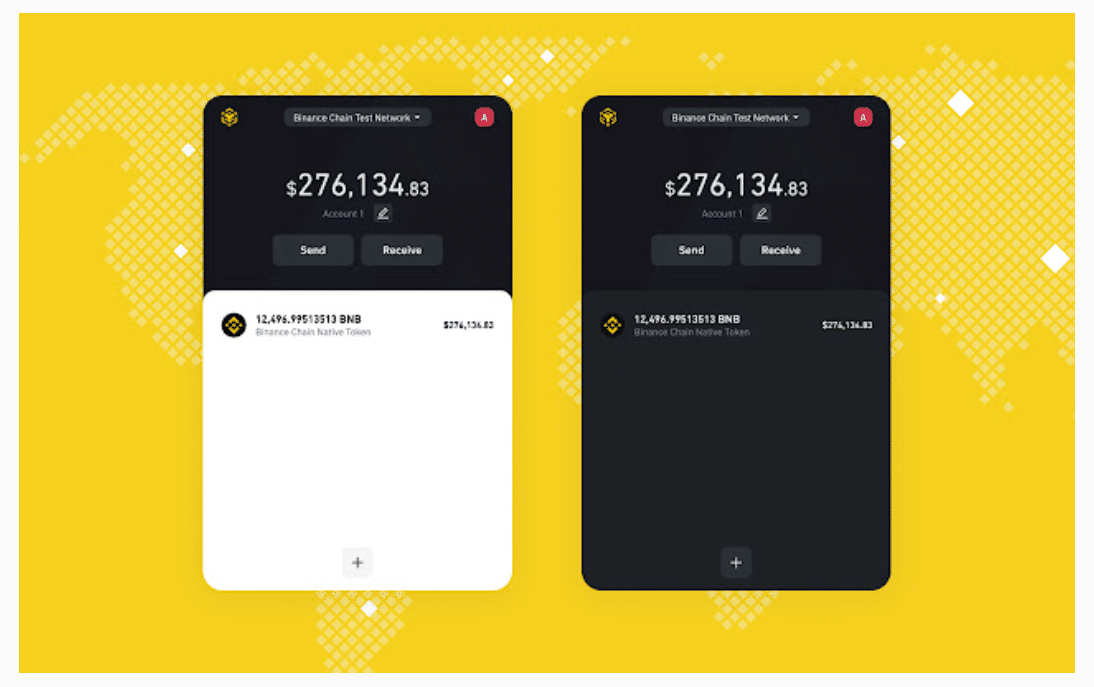
While the Binance Chain Wallet offers convenience for Ethereum investors, its web browser format does mean that ETH coins are more susceptible to hacking attempts. To combat this risk, Ethereum private keys are stored locally and backup is provided either via a mnemonic seed phrase or via a tKey, which is a multi-authentication option. The wallet also leverages all of the security insights captured by the wider Binance cryptocurrency exchange.
Innovatively, for those Ethereum holders that use the Binance crypto exchange, the Binance Chain Wallet can be instantly connected with a Binance exchange account. A major advantage of this wallet is that Ethereum can be sent from a Binance exchange wallet to the Binance Chain Wallet without the need to copy and paste wallet addresses. The instant connection feature means that Ethereum coins can be sent quickly back to the popular cryptocurrency exchange if a trade needs to be executed.
Overall, the Binance Chain Wallet is a smart choice for Ethereum investors looking for a convenient web-based browser that can provide easy connectivity with both the Ethereum and BNB blockchains. For existing Binance holders it could be particularly useful. However, due to its web-based format, it may not be the most secure option for storing a significant proportion of an Ethereum portfolio.
Binance wallet Pros:
- Zero up-front cost and can be used for free
- Seamless integration to the Binance exchange
- Highly convenient for NFT and crypto traders
Binance wallet Cons:
- Not suitable for holding large amounts of Ethereum
- Not as secure as hardware wallets
3. Ledger Nano X – Best For Wireless Hardware Security
Ledger has been creating non-custodial hardware crypto wallets for several years but released its premium storage device in 2019. Building from previous models, the Ledger Nano X is now one of the best Ethereum wallets available, blending offline protection with online convenience.
Key Highlights:
- Keeps Ethereum private keys securely stored offline
- Bluetooth connectivity allows for the management of Ethereum holdings while disconnected from a computer
- Ethereum can be managed from both desktop and mobile applications
- Supports over 5,500 other digital assets
Shaped like a USB stick, the Nano X is a physical device that can be connected to a laptop or computer using a USB-C cable. Once connected, the device then interacts with Ledger’s proprietary wallet software, Ledger Live. Multiple Ethereum wallets can be created and all Ethereum private keys are stored locally on the Nano X to provide optimum security and are widely regarded as one of the best hardware wallets in the crypto industry.
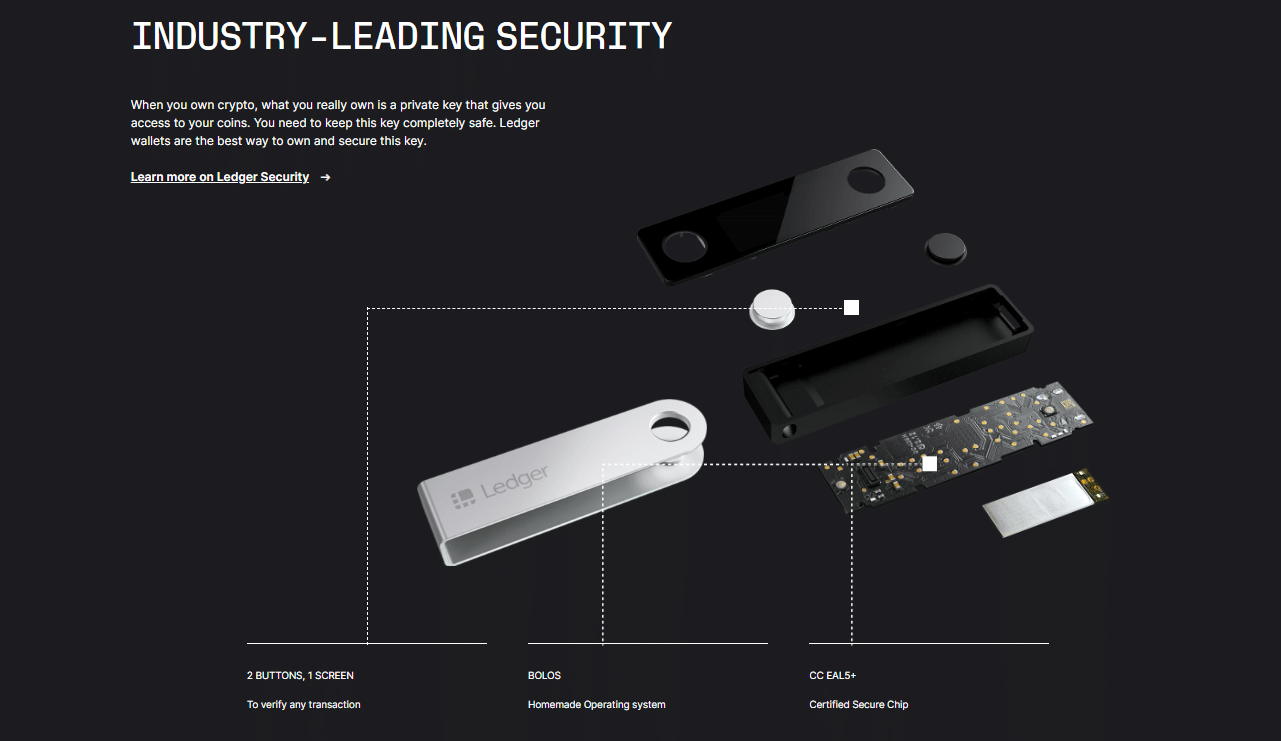
To improve the convenience of hardware wallets, Ethereum coins can also be accessed even when a USB-C cable is unavailable. Leveraging Bluetooth connectivity and a built-in battery, the Nano X can be connected to an Ethereum wallet at any time. Wallets can be managed from both Ledger Live’s desktop software, and also Ledger Live’s mobile app. Setup on both is quick, efficient, and can be achieved in a few simple steps. Alongside ETH, the wallet supports over 5,500 different digital assets, including a range of NFTs. Moreover, the Ledger Nano X is one of the best ways to stake Ethereum 2.0 tokens.
Unfortunately, for the advanced protection of Ethereum coins, prices for the Nano X are higher than that of software wallet alternatives, such as ZenGo, Exodus, and Rainbow. Retailing at $165, the wallet is one of the more expensive options to store Ethereum on the market. Investors should consider if the security and convenience offered by the Nano X is worth the extra cost in our opinion.
Ledger Nano X Pros:
- Tried and tested wallet that has stood the test of time
- Small and compact device that is easily transportable
- Can also be used to store NFTs and stake Ethereum
Ledger Nano X Cons:
- One of the more expensive hardware wallets on the market
- Must be connected with a cable to send Ethers
4. MetaMask – Best ETH Wallet For dApps
MetaMask is a non-custodial Ethereum wallet that was launched in 2016 by a company called Consensys. Initially launched as a web-based browser extension, the wallet was developed to simplify the process of accessing blockchain-based decentralized applications (dApps). The Ethereum wallet has now grown to over 10 million active users in 2021.
Key Highlights:
- Accessed as a browser extension or mobile application
- Connect with Ethereum decentralized applications in a few clicks
- Quickly transfer Ethereum from wallet to exchanges
- Intuitive and simple to use interface
- Buy extra Ethereum and swap Ethereum directly through decentralized exchanges
MetaMask was initially developed on top of the Ethereum blockchain and, therefore, is well suited to the Ethereum ecosystem. The web wallet is compatible with all Chromium-based browsers including Google Chrome, Firefox, and Brave. In addition to the browser wallet, MetaMask later released a mobile version of the Ethereum wallet which can be downloaded and installed on both Android and iOS for free.
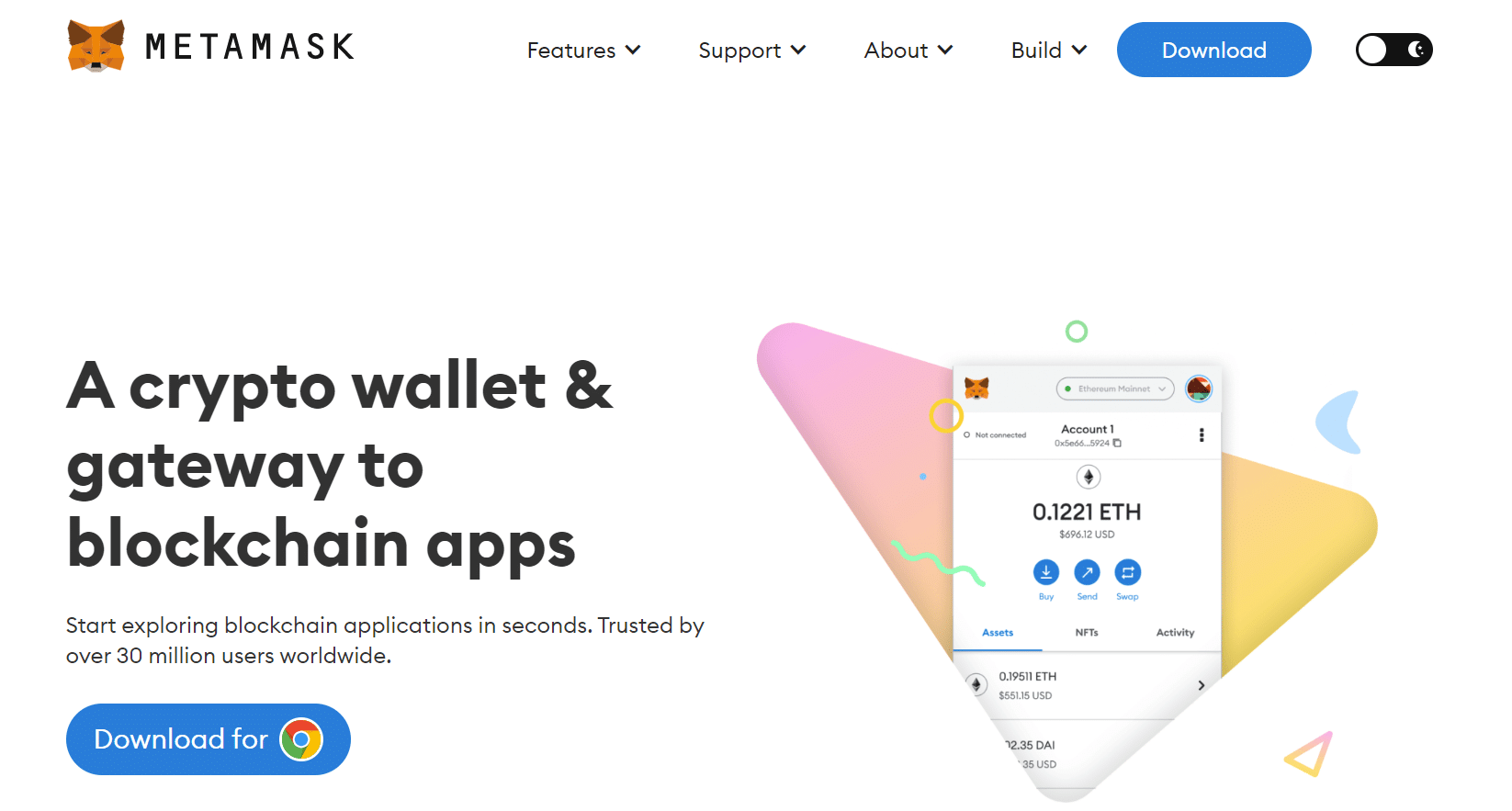
MetaMask allows users to connect with Ethereum-based decentralized applications in just a few short clicks. The wallets user interface is clean and intuitive which means Ethereum coins can be used quickly with lending and borrowing platforms, decentralized exchanges (DEXs), or NFT marketplaces.
However, investors should keep in mind that, like the Binance Chain Wallet, MetaMask is a hot cryptocurrency wallet. While Ethereum private keys are stored locally on a device and all communication is secured by several layers of encryption, Ethereum coins are more at risk when compared with hardware wallets. For those concerned about security, a hardware wallet, such as the Ledger Nano S Plus or Trezor Model T might be a better option when securing a larger Ethereum portfolio.
Like the majority of other Ethereum wallets, MetaMask also offers internal functionality for Ethereum holders. Ethereum can be swapped using the wallet’s internal swap function or additional ETH can be purchased directly via third-party providers. Innovatively, when swapping Ethereum, the MetaMask wallet searches for the best possible exchange rate across the most popular decentralized exchanges (DEXs).
One important point to note when considering MetaMask is that the connection between Ethereum and MetaMask is facilitated through a company called Infura. Even with this single point of failure, MetaMask still remains one of the top choices for those looking to utilize Ethereum and access decentralized Ethereum apps. While it is not suitable for a large Ethereum portfolio, it is certainly one of the most convenient options. One drawback that should be considered is the inability to withdraw from Metamask to a bank account.
Metamask wallet Pros:
- Great for Ethereum only investors
- Supported by Coinbase, Binance and many other platforms
- Free to download and use
Metamask wallet Cons:
- Not suitable for large ETH investments due to lower security
- Reliant on a third-party to remain operational
5. Ledger Nano S Plus – Best Value For Money Wallet
The Ledger Nano S Plus is another cold storage device within Ledger’s line-up. As an Ethereum-supported wallet, it provides an excellent option for those looking for hardware security without the hefty price tag.
Key Highlights:
- Securely store Ethereum private keys offline
- Multiple Ethereum wallet creation
- Buy extra Ethereum and swap Ethereum directly through Ledger Live
- Spend Ethereum using CL crypto card
- Wide range of support for over 5,500 different cryptocurrencies
As a replacement for the recently retired Ledger Nano S, which was first released in 2016, the Nano S Plus hardware wallet remains one of the most popular Ethereum wallets in the world. Like the Ledger Nano X, the Nano S Plus is a physical device shaped like a USB stick, which allows for Ethereum private keys to be securely stored offline.
In addition to Ethereum support, the Nano S Plus utilizes a large internal memory to accommodate up to 100 different cryptocurrency apps and supports over 5,500 different digital assets. Alongside ETH, the Nano S Plus can secure BTC, XRP, ADA, SOL, ATOM, and many others.
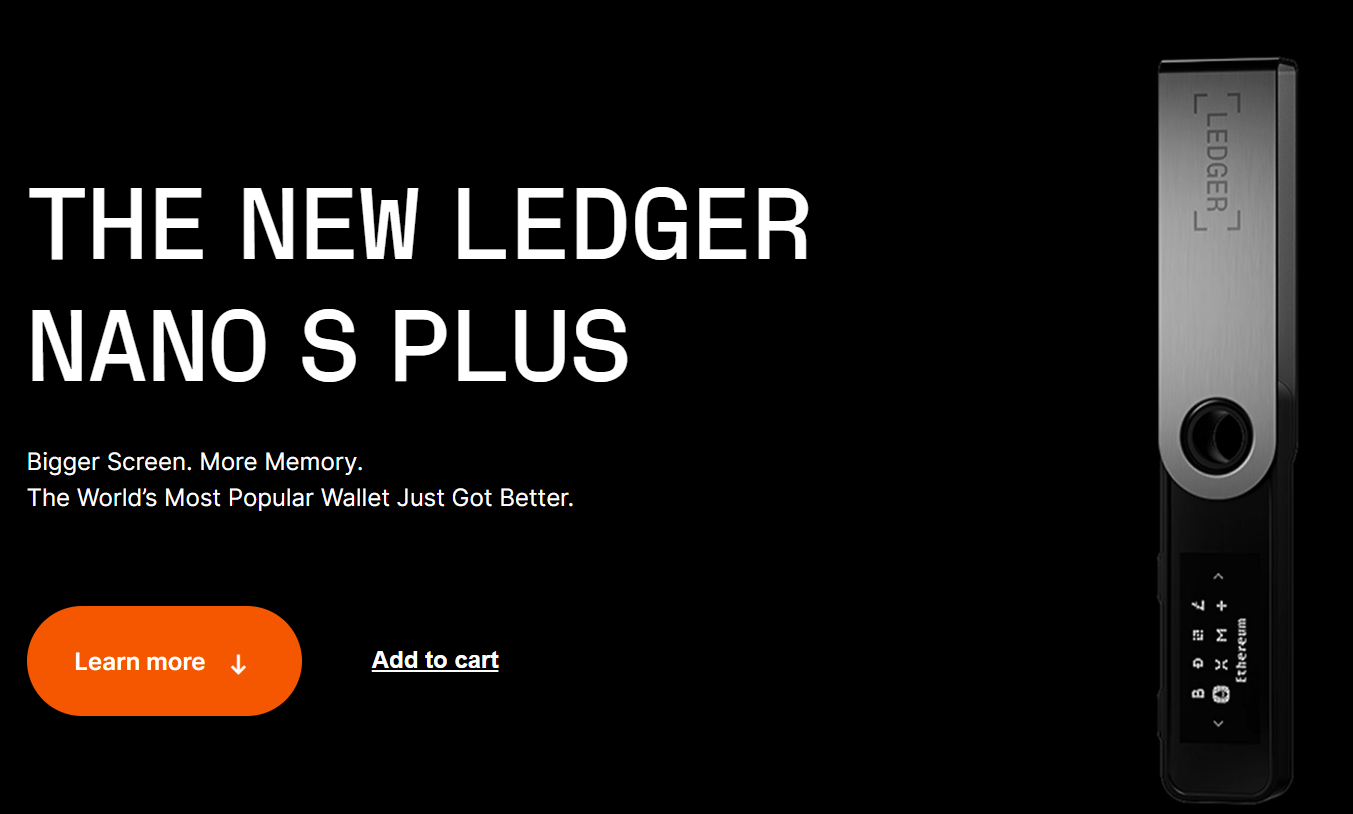
Like the Nano X, Ethereum stored in the wallet is managed through the Ledger Live software, which can be downloaded as a desktop application for computer users or as a mobile application for Android smartphone users. Inconveniently, the wallet must always be connected via cable before Ethereum coins can be moved.
In comparison to intuitive software wallets such as ZenGo or Exodus, Ledger Live’s interface can take a little time to get used to. However, it is efficient, clean, and is now packed with useful features to improve and amplify Ethereum holders’ experience. Ethereum can be directly purchased from within Ledger Live and also swapped for other cryptocurrencies directly from within the app.
Even with slight inconveniences, the Nano S Plus remains one of the best value-for-money options when it comes to Ethereum wallets. Although more expensive than free software alternatives such as ZenGo, Exodus, or MetaMask, the offline security offered by the Nano S Plus wallet means it is ideal for storing a large amount of Ethereum coins.
Ledger Nano S Plus Pros:
- Great security features to secure Ethereum private keys
- Ideal for storing large amount of Ethereum
- Ability to swap and stake Ethereum through Ledger Live software
Ledger Nano S Plus Cons:
- Software to operate is not as beginner-friendly as ZenGo
- Must be connected via a cable to send and receive the stored ETH
- Cost money to purchase
6. Trezor Model T – Best ETH Hardware Wallet for Security
The Trezor Model T hardware wallet was created by an organization known as Satoshi Labs. Like Ledger, Satoshi Labs have been competing within the hardware wallet sector for many years and remain Ledger’s strongest competitor. After initially developing and launching the Trezor Model One in 2014, the Trezor Model T was later launched in 2018 as the premium alternative.
Key Highlights:
- Securely store the Ethereum private key offline
- Considered to be the most secure Ethereum wallet available
- Users can set up a secondary internal Ethereum wallet with a separate password
- Touch screen display allows for easy management
- Buy extra Ethereum and swap Ethereum directly through the Trezor Wallet app
Although the Trezor Model T is an advanced hardware wallet, the wallet is easy to set up and use, which is excellent for those unfamiliar with Ethereum. The wallet works in conjunction with the Trezor Wallet application which allows users to manage Ethereum holdings. As a bigger physical device, the Model T offers an integrated touch screen display that improves upon the sometimes-cumbersome buttons on competing devices.
As a physical device, the Model T inherently offers crypto investors premium protection for Ethereum coins. The Ethereum private key is stored inside the physical device which keeps them offline. However, to manage or move Ethereum the device must be connected using a USB-C cable and a PIN code must be entered. This means that the wallet is not ideal for those looking to trade Ethereum quickly.
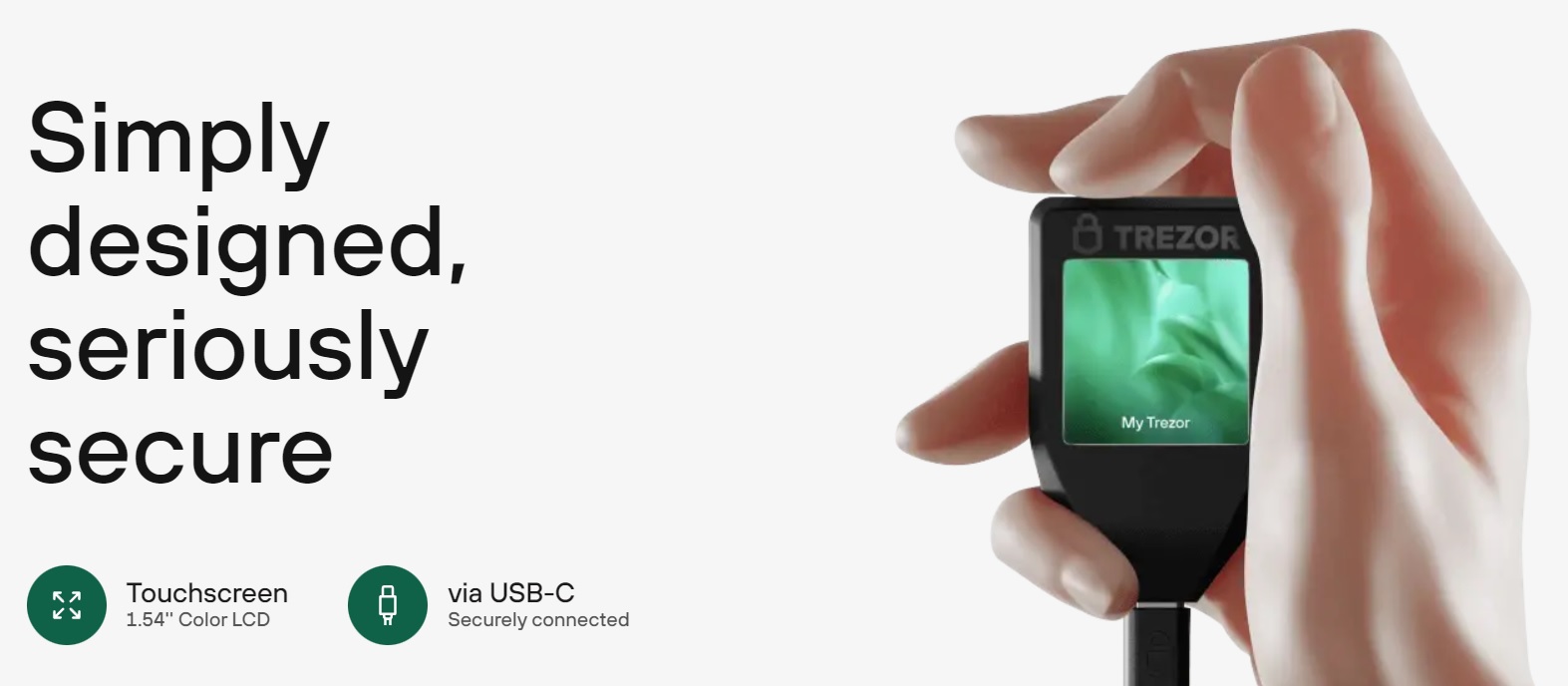
For security-conscious individuals, Trezor offers the ability to create a separate internal Ethereum wallet that is protected by another seed phrase. Even if the primary PIN is compromised, Ethereum stored within the internal wallet would remain secure.
In addition to ETH, the device supports over 1000 different cryptocurrencies, including BTC, BCH, ADA, LINK, and DOGE. On top of the vast range of cryptocurrency support, Ethereum holders can also enjoy extra functionality within the Trezor Wallet application, including the ability to buy extra ETH or swap for other cryptocurrencies. Like competitors, this removes the need to send Ethereum to a third party.
Unfortunately, advanced security comes at a hefty price. At $300 the Trezor Model T is one of the most expensive Ethereum wallets on this comparison list. It is nearly double the cost of its closest competitor (the Ledger Nano X). However, if investors are comfortable with the higher cost, the wallet is undoubtedly one of the most secure options available. For a cheaper alternative to the Model T version, there is also the Trezor Model One to consider.
Trezor Model T Pros:
- Excellent security compared to other hardware devices
- Intuitive touch-screen for ease of use compared to the Nano S
- Ability to quickly convert ETH on the device to other cryptos
Trezor Model T Cons:
- One of the most expensive Ethereum wallets on the market
7. Exodus – Best Wallet For Connectivity
The Exodus cryptocurrency wallet was launched in 2015 and has become a favorite among Ethereum holders. After first launching as a desktop application, developers later released an accompanying mobile application, which has advanced Exodus’ reach. The software wallet is a strong option for those looking for a flexible Ethereum wallet that offers complete control over coins.
Key Highlights:
- Free Ethereum wallet that can be used via desktop, mobile, and web-browser applications
- Simple and intuitive user interface suitable for beginners
- Trade ETH coins directly through FTX
- The wallet can be synced with Trezor hardware to offer heightened security
- Compatible with over 230 other cryptocurrencies
When it comes to Ethereum connectivity the Exodus wallet is hard to beat. The wallet comes in desktop, mobile, and web browser formats, which means that users can utilize 1 or use a combination of all 3 to ensure Ethereum coins remain accessible. Ethereum private keys are stored locally depending on the format chosen and a mnemonic seed phrase is provided for backup.
Related: The best ways to store a wallet seed phrase.
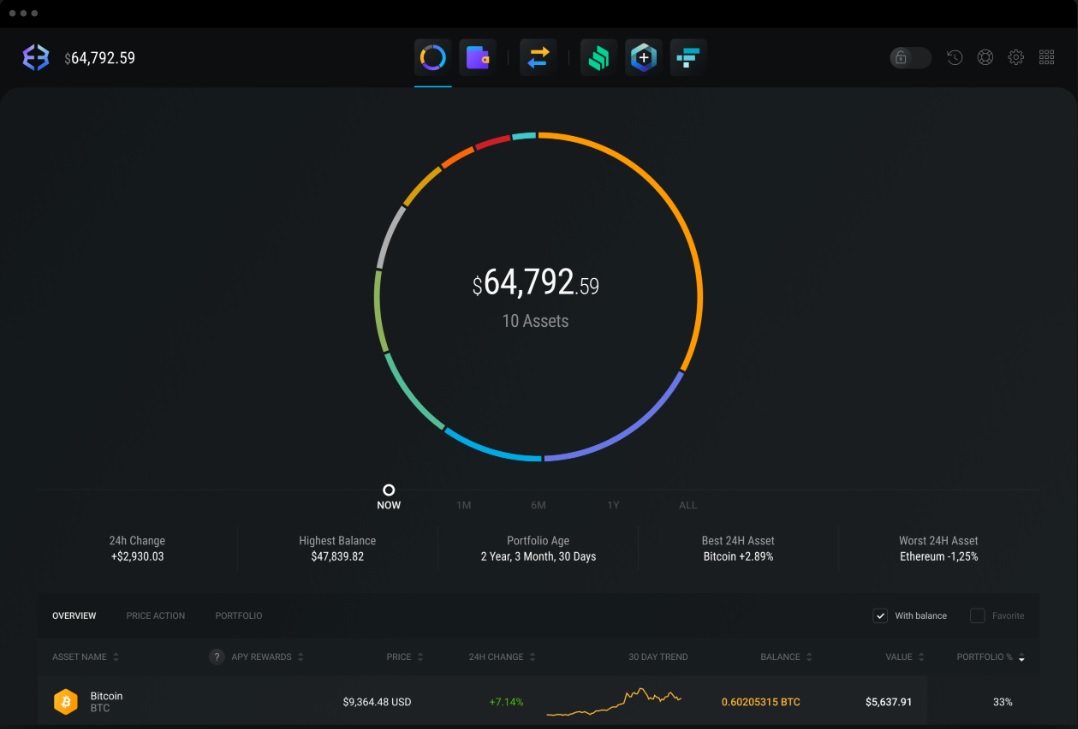
In addition to Ethereum, the wallet is also compatible with over 230 different cryptos thanks to its multi-blockchain support. With its clean interface, the wallet should be comfortable for both new and advanced Ethereum investors to use. The wallet is easy to set up and Ethereum holders can connect to decentralized applications in a few clicks. If there are ever any issues, Exodus is unique in that it provides a 24/7 human support line for queries.
Although convenient, larger Ethereum investors may find the security of Exodus a little light. Unlike many other software wallets, Exodus does not implement 2FA due to the dependency on the associated 2FA device. Instead, Exodus encourages the use of a Trezor hardware wallet to protect Ethereum's private keys. Although secure, Exodus does not provide the same level of security as other software wallet alternatives such as ZenGo.
The Exodus wallet remains one of the best for Ethereum connectivity. Ethereum coins can be quickly transferred from the wallet and the user interface makes it easy to navigate. If Ethereum holders can overlook the hit-and-miss feature list, the Exodus wallet could be a useful companion for most.
Read our full review of the Exodus Wallet and how to withdraw from Exodus.
Exodus wallet Pros:
- Flexible ETH wallet will suit a variety of investors and traders
- Ability to trade Ethereum through the FTX platform
- Clean cut interface that is easy to use
- Free to downloand and use
Exodus wallet Cons:
- Security features are not as extensive as other wallets
- Does not support Ethereum staking
8. Rainbow Wallet – Best Ethereum Storage Wallet For Mobile
Rainbow wallet was launched in 2019, which makes it one of the youngest Ethereum wallets that we have on the list today. Although the wallet has only been around for a few years, it has already amassed a significant following, primarily thanks to its intuitive user interface. Specifically, the mobile wallet aims to simplify the way consumers connect with the sometimes complicated world of decentralized applications (dApps) that are built on the Ethereum blockchain.
Key Highlights:
- An Ethereum-focused mobile wallet that is free to download
- Easy-to-use interface that aims to improve the complexity of Web3 dApps
- Ethereum private keys are stored locally on a mobile device
- Recovery phrase can be backed up using iCloud, Google Drive, or a password manager
- Can connect a human-readable ENS domain name
As a mobile-only app, the Rainbow Ethereum wallet can be downloaded for free on both Android and iOS devices. The private key is stored on a mobile device, which means that Ethereum investors remain in control of funds at all times. For recovery, a mnemonic seed phrase is provided by Rainbow, which can be backed up using the iCloud Backup Feature, Google Drive, or a separate password manager.

The app has garnered attention due to its fresh and clean user interface. The innovative UI makes it extremely easy to navigate and, importantly, simplifies the process of interacting with Web3 dApps. This makes the wallet particularly attractive for new Ethereum holders. The Rainbow Wallet provides a comfortable environment for investors to understand Ethereum and how sectors such as DeFi and NFTs fit within the wider Ethereum ecosystem.
Related: What is DeFi and how does it work?
However, all processes must be completed via a user’s smartphone, which is not always the best when interacting with Web3 dApps. As Ethereum private keys are stored on the mobile device, an investor also needs to be careful who gains access to the phone.
In line with the team’s focus on improving the accessibility of Ethereum dApps, Rainbow has integrated with a leading decentralized exchange, Uniswap. Users of Rainbow can instantly swap Ethereum using Uniswap’s internal AMM without relinquishing control of coins. In addition, users can purchase ETH and DAI directly using convenient payment methods, such as Apple Pay.
To round off Rainbow Wallet’s convenience, the wallet offers users the opportunity to use a human-readable address generated through the Ethereum Name Service (ENS). Instead of typing a long string of numbers and letters for a wallet address, users can type an ENS handle into Rainbow, and funds can be transferred as normal.
Rainbow is a wallet focused on making Ethereum experiences as easy as possible. For those starting their Ethereum journeys and are happy to transact from their mobile, it is one of the best options currently available. However, advanced Ethereum users that are looking to interact with applications on a daily basis may prefer alternative options.
Rainbow wallet Pros:
- Very modern and beginner-friendly wallet application
- No cost to download and store Ether
- The mobile app is very convenient and accessible 24/7
Rainbow wallet Cons:
- Lower security compared to ETH hardware wallet solutions
- Does not have features such as ETH staking or earning interest
Types of Ethereum Wallets to Choose
There is a huge variety of Ethereum wallets that all differ based on security, features, and price. Most wallets fall into 1 of 2 categories: (1) hot and (2) cold. Hot wallets are crypto wallets that are connected to the Internet. Meanwhile, cold wallets are crypto wallets that can remain disconnected from the Internet when not in use. To help understand the difference between each, here is a quick overview.
- Hot wallets. A hot wallet is a type of wallet that is connected to the internet. Common examples include crypto exchanges and platforms to store customers' active funds while trading. There are a lot of hot wallets for ETH traders to choose from, whether it be a browser extension or desktop/mobile application. Although a hot wallet gives investors control over their assets, they still aren’t the safest option for storing ETH and are vulnerable to hacks and other exploits while connected to the blockchain.
- Desktop wallet. Desktop wallets are downloaded as desktop applications. The private keys of Ethereum are then stored locally on the computer. Most desktop wallets are free and easy to use, convenient, as they can be accessed at any time from a computer, and many offer non-custodial care, which ensures that an investor remains in control of their ETH purchase. However, a desktop wallet is connected to the Internet anytime that a computer is. Although convenient, desktop wallets are more vulnerable to security breaches if a malicious party gains access to an investor’s computer.
- Web wallets. These are any type of wallet that is hosted on online servers. This category of wallets can include custodial wallets that are based on a crypto exchange and non-custodial wallets that can be installed as a browser extension. Web-based wallets are likely the most convenient when it comes to interacting with crypto applications. However, due to being active on the web, these wallets are also the most likely to be exploited.
- Mobile wallets. These are mobile applications that allow users to store and manage cryptocurrencies from a smartphone. These wallets are perfect for keeping track of cryptocurrencies on the go, however, as private keys are often stored locally on the device these wallets do come with their own risks. With private keys stored locally, it does mean that mobile wallets are dependent on access to a phone. Mobile wallet users, therefore, need to be careful who gets access and as phones can be easily lost or stolen, it may prevent an investor from reaching crypto funds.
- Hardware wallets. These are often touted as the most secure option. As physical devices, these wallets can store private keys and then be disconnected from the Internet. The lack of connection to the Internet means that private key access remains extremely secure. Most hardware wallets now come with native software that helps users manage and look after assets. Unfortunately, for the security offered, hardware wallets are the most expensive option for investors.
- Paper wallets. Paper wallets involve writing down the public and private keys of cryptocurrencies on a piece of paper. The information is then kept somewhere secure such as in a private safe. Although the most economical, this method is probably the least secure due to the vulnerabilities of storing information on paper. Paper wallets can be easily damaged and are, therefore, not an option recommended for crypto investors.
Frequently Asked Questions
What is an Ethereum wallet?
An Ethereum wallet is crucial for those considering buying Ethereum coins (Ether). The wallet provides a connection to the Ethereum blockchain and allows investors to send and receive digital Ethereum coins. However, it is not the coins that are stored within the wallet. It is the private keys.
Can Ethereum wallets store NFTs?
NFTs are often associated with images, NFTs are just another form of cryptocurrency token. This means that these assets can leverage the same storage devices that cryptocurrencies do and be held on an Ethereum wallet. Most wallet providers will openly state if a device can store NFTs and, if so, which type of NFTs it can store. For example, Ethereum-based NFTs typically use the ERC-721 and ERC-1155 token standards. However, it is important to check with the wallet supplier before transferring digital assets.




